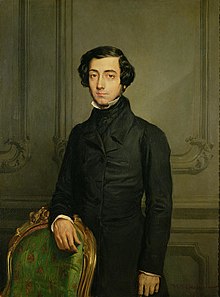
Back Alexis de Tocqueville Afrikaans Alexis de Tocqueville AN ألكسيس دو توكفيل Arabic الكسيس دو توكفيل ARZ Alexis de Tocqueville AST Aleksis de Tokvil Azerbaijani Алексіс дэ Таквіль Byelorussian Алексис дьо Токвил Bulgarian Alexis de Tocqueville Breton Alexis de Tocqueville BS
Alexis de Tocqueville | |
|---|---|
 1850 portrait by Théodore Chassériau | |
| Minister of Foreign Affairs | |
| In office 2 June 1849 – 30 October 1849 | |
| Prime Minister | Odilon Barrot |
| Preceded by | Édouard Drouyn de Lhuys |
| Succeeded by | Alphonse de Rayneval |
| President of the General Council of Manche | |
| In office 27 August 1849 – 29 April 1852 | |
| Preceded by | Léonor-Joseph Havin |
| Succeeded by | Urbain Le Verrier |
| Member of the National Assembly for Manche | |
| In office 25 April 1848 – 3 December 1851 | |
| Preceded by | Léonor-Joseph Havin |
| Succeeded by | Hervé de Kergorlay |
| Constituency | Sainte-Mère-Église |
| Member of the Chamber of Deputies for Manche | |
| In office 7 March 1839 – 23 April 1848 | |
| Preceded by | Jules Polydore Le Marois |
| Succeeded by | Gabriel-Joseph Laumondais |
| Constituency | Valognes |
| Personal details | |
| Born | Alexis Charles Henri Clérel de Tocqueville 29 July 1805 Paris, France |
| Died | 16 April 1859 (aged 53) Cannes, France |
| Resting place | Tocqueville, Manche |
| Political party | Movement Party[1][2] (1839–1848) Party of Order (1848–1851) |
| Spouse |
Mary Mottley (m. 1835) |
| Alma mater | University of Paris |
| Profession | Historian, magistrate, jurist |
| Signature |  |
Philosophy career | |
| Notable work | Democracy in America (1835) The Old Regime and the Revolution (1856) |
| Era | 19th-century philosophy |
| Region | Western philosophy |
| School | Liberalism[3][4][5] Liberal conservatism[6] |
Main interests | History, political philosophy, sociology |
Notable ideas | Voluntary association, mutual liberty, soft despotism, soft tyranny, Tocqueville effect |
Alexis Charles Henri Clérel, comte de Tocqueville[a] (29 July 1805 – 16 April 1859),[7] was a French aristocrat, diplomat, sociologist, political scientist, political philosopher, and historian. He is best known for his works Democracy in America (appearing in two volumes, 1835 and 1840) and The Old Regime and the Revolution (1856). In both, he analyzed the living standards and social conditions of individuals as well as their relationship to the market and state in Western societies. Democracy in America was published after Tocqueville's travels in the United States and is today considered an early work of sociology and political science.
Tocqueville was active in French politics, first under the July Monarchy (1830–1848) and then during the Second Republic (1849–1851) which succeeded the February 1848 Revolution. He retired from political life after Louis Napoléon Bonaparte's 2 December 1851 coup and thereafter began work on The Old Regime and the Revolution.[8] Tocqueville argued the importance of the French Revolution was to continue the process of modernizing and centralizing the French state which had begun under King Louis XIV. He believed the failure of the Revolution came from the inexperience of the deputies who were too wedded to abstract Enlightenment ideals.
Tocqueville was a classical liberal who advocated parliamentary government and was sceptical of the extremes of majoritarianism.[8] During his time in parliament, he was first a member of the centre-left before moving to the centre-right,[9] and the complex and restless nature of his liberalism has led to contrasting interpretations and admirers across the political spectrum.[3][4][5][10]
- ^ Boucaud-Victoire, Kévin (2017). La guerre des gauches. Editions du Cerf.
- ^ Véricour, Louis Raymond (1848). Modern French Literature. Gould, Kendall and Lincoln. p. 104.
- ^ a b Jaume, Lucien (2013). Tocqueville: The Aristocratic Sources of Liberty. Princeton University Press. p. 6.
The "liberal" label is not misplaced, because Tocqueville described himself as a liberal.
- ^ a b Kahan, Alan S. (2010). Alexis de Tocqueville. A&C Black. pp. 112–122.
- ^ a b Muthu, Sankar (2012). "Republicanism, Liberalism, and Empire in Postrevolutionary France". Empire and Modern Political Thought. Cambridge University Press. pp. 261–291.
- ^ Lakoff, Sanford (1998). "Tocqueville, Burke, and the Origins of Liberal Conservatism". The Review of Politics. 60 (3): 435–464. doi:10.1017/S003467050002742X. ISSN 1748-6858. S2CID 145118465.
- ^ Cite error: The named reference
EB1911was invoked but never defined (see the help page). - ^ a b Hansen, Paul R. (February 2009). Contesting the French Revolution. Wiley-Blackwell. p. 3. ISBN 978-1-4051-6084-1.
- ^ Jennings, Jeremy (2011). Revolution and the Republic: A History of Political Thought in France Since the Eighteenth Century. Oxford University Press. p. 188. ISBN 978-0-19-820313-1.
- ^ Richter, Melvin (2004). "Tocqueville and Guizot on democracy: from a type of society to a political regime". History of European Ideas. 30 (1): 61–82. doi:10.1016/j.histeuroideas.2003.08.006. S2CID 143728735.
Cite error: There are <ref group=lower-alpha> tags or {{efn}} templates on this page, but the references will not show without a {{reflist|group=lower-alpha}} template or {{notelist}} template (see the help page).